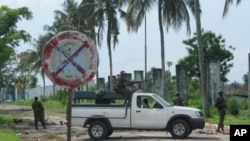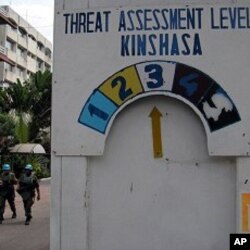As atrocities persist in the eastern Democratic Republic of Congo, two U.S. authors have delved deeply into the country's troubles, trying to explain the situation to an outside audience. Warfare in the vast central African nation is estimated to have caused the deaths of more than five million people from combat and the related humanitarian crisis. There has also been a very high number of rapes.
Author Jason Stearns has just released Dancing in the Glory of Monsters which he says is for anyone interested in world affairs, and specifically, in this case, coming to a better understanding of the deadliest conflict since World War II.
"The book is really trying to get away from this notion that is often painted of the Congo war in the press, of either something too complex to understand, a mess of sort of different narrative strands and armed groups, or a very simplistic sort of story of savage warlords, raping and pillaging their way across the country in order to get their hands on minerals or other wealth," he said.
He says most of the book was written from the perspective of warlords, child soldiers, government ministers and diplomats involved in the day-to-day proceedings of the war.
Stearns says he found the gradually scaled down war has not had easily identifiable villains, or ethnic and economic equations, but rather resulted from a diseased political system.
The author explains the book's title comes from a speech by former rebel leader turned president Laurent-Desire Kabila who was later assassinated and replaced as president by his son Joseph Kabila.
In his speech, the elder Kabila referred to the long-time ruler he deposed, the previously U.S.-backed Mobutu Sese Seko.
"He was confronted with a crowd of people who were screaming, 'Down with Mobutu, Down with Mobutu' and he turned on them and he said, 'Everybody here who is screaming, 'down with Mobutu', every single one of you, you have been complicit in Mobutu's system. You did not protest against him. You probably took bribes. You were not protesting in the streets. I have seen all of you dancing in the glory of the monster. And of course, Kabila went on to become a monster of his own kind, but it is this idea that it is more about the political system," he said.
Another book about the Congo, and more specifically its women, called A Thousand Sisters, came out in paperback last month.
Author Lisa Shannon describes the response she has received from her readers.
"They often cry and then they want to get involved and actually do something. I meant it to be a very personal book, one that would basically give Americans a chance to feel like they had travelled to Congo and made friends with Congolese women and gotten to know them," she said. "A lot of women want to get involved in trying to affect policy change to help secure the Congo. So, it seems to spur people to action, which was the whole point for me writing the book."
Shannon says she is recommending to book clubs combining her own book with the one by Jason Stearns.
"My approach was very much a view of the war through the eyes of victims, through the most grassroots members of Congolese society, just living on the frontlines," she said. "Like, what does it feel like to be a woman living in Congo, whereas Jason's book very specifically takes the view of perpetrators. Why did people do this? Why did this happen and really analyze the context that allowed this to happen. So it is sort of the micro view and the macro view, they are a perfect complement."
Shannon agrees to speak by phone directly to book clubs with 20 or more members. High-profile television appearances to promote her book led to $11 million being raised, helping 11,000 Congolese women who have on average about five children each.
Both authors say they hope their books will spur more engagement from the international community to help end the violence. The United Nations says more than 15,000 rapes were committed in eastern Congo last year despite the presence of its large peacekeeping force.
Shannon, whose business card reads writer/activist, says it can be frustrating to see the horrors persist.
"I find it enormously frustrating that the mass atrocity continues," said Shannon. "My tolerance for the international community and our leaders sort of grand statements about grave concern without actually doing anything or coordinating with each other to have the biggest impact makes me crazy. But the flip side of that is I do feel more hopeful than ever because in my experience once everyday people learn about what is happening, they actually do care a lot and they want to get involved. So I see a shift in that there is a movement now for Congo that there was not when I began this journey."
The two authors are also active on the Internet. Stearns has a blog called Congo Siasa which he says provides a nuts and bolts unpacking of day to day Congolese politics.
Elections are scheduled for November, but Congolese democracy activists are worried there is no sense of urgency for these elections to be organized on time. They also have concerns a law was changed to make the election a one round contest rather than two rounds, making the divided opposition much less likely to be able to seriously challenge President Joseph Kabila.






